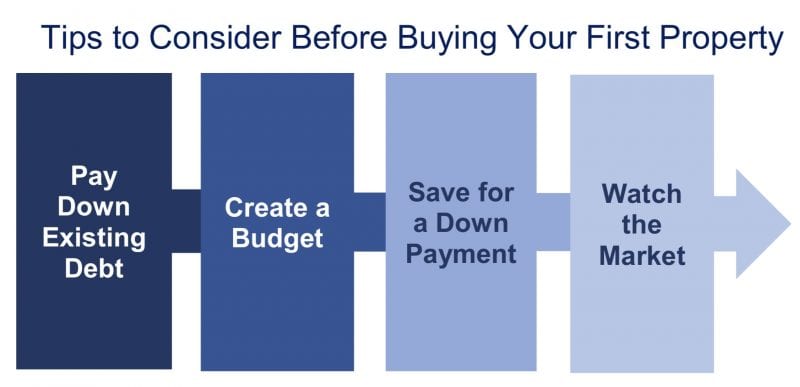
Buying your first investment property is a great way to boost supplemental income or even replace your traditional 9-5 day job. In fact, getting into the rental property business can be extremely lucrative, if approached the right way. However, it is vital as a first-time investor to not get caught up in the excitement of buying a rental property. Making sound financial and business decisions based on a solid foundation is the best way to achieve success.
Exciting as it may be, investing comes with risks that you may not be aware of – ones that have the potential to affect the success of your rental property business for years to come. Therefore, this is a decision to take very seriously. If you want to avoid significant mistakes when you set out to invest in your first rental property, read on to find some helpful tips designed to guide a first-time investor in the right direction.
What to Know Before Investing in Rental Property?
Purchasing investment properties and establishing a rental income is both a profitable and risky endeavor. That said, there is a lot to consider as you decide which investments are best for your goals. Before proceeding, join us below as we discuss a few items to evaluate as you search for a rental property.
How to Evaluate Potential Rental Property Income – The 1% Rule
Landlords invest to generate income, and the ability to do so is a big focus. As you look for potential properties, evaluate that property’s ability to produce the income and profit margin you are looking for. Researching the area along with what is currently on the market, as well as what has rented recently, provides an excellent overview of possible rental rates.
One tool to use in determining a property’s viability is the 1% rule. Simply put, the gross yearly rental income should equal a minimum of 1% of the purchase price. While this is not the only factor to weigh, this guideline helps ensure the property will create enough income to cover expenses.
How to Anticipate Expenses of Owning a Rental Property – The 50% Rule
Planning for expenses is a vital part of the rental investment process. The 50% rule takes a look at operating expenses versus gross income. It states that landlords need to plan for 50% of the rental income to go towards property operating expenses. Below are some ordinary operating expenses owners will incur.
- Property Taxes
- Landlord and Property Insurance
- Repairs
- Maintenance Expenses
- Owner-Paid Utilities
- Vacancy Loss
- Management Fees
How to Calculate Returns for a Profitable Rental Property
The next aspect of evaluating is cash-on-cash returns for a potential rental property. These results indicate a property’s profitability and should be carefully considered. Generally, a result of 8% to 12% is reasonable, but remember, this does not factor in budgeting for unexpected costs, mortgage payments, or capital expenditures. To calculate cash-on-cash return, follow the following formula:
- Step 1: Gross Income – Operating Expenses = Annual Net Income
- Step 2: Annual Net Income / Purchase Price = Cash-on-cash Return (convert to percentage)
Need additional help? Check out the free Investment Property Calculator from AARP.
How to Choose Profitable Rental Property
Many factors determine whether a rental property is or is not a viable, and therefore profitable, option. Before purchasing, consider these factors below and make sure they align with your overall goals.

- Location: Rule #1 of real estate! Location directly impacts your pool of tenants and, in turn, your profits. Also important is to research local codes. As a landlord, you could pay hefty fees in some areas as opposed to others.
- Property Taxes: Taxes can fluctuate in various locations. Even non-desirable markets can have exorbitant taxes, so do your research.
- School Ratings: School districts that are more desirable increase rental value and resale value. Especially for larger single-family homes.
- Crime: Local police or online searches provide a wealth of statistics on the frequency and type of crimes in a particular area. This is a significant factor in the rentability of a home as everyone wants to feel safe and secure.
- Amenities: Check out local gyms, coffee shops, and amenities that might appeal to your tenants. Getting to know a location better aids in marketing the property to potential renters.
- Local Market: See what the local rental rates are and what competition is out there. High volume may indicate a seasonal trend or potential trouble, knowing which is vital.
- Average Rental Rate: Compare your potential purchases against similar units currently on the market or those recently rented. You likely already know the rent you need to cover expenses and mortgage. So, if that isn’t in line with the market, it is time to reevaluate.
Pro Tip: For additional information and tips, check out our blog.
Helpful Tips for Investing in Your First Rental Property

So, you have decided to take the plunge into an investment property, that is exciting. To get the most return for your money, it is vital to make well-informed and calculated decisions. As you begin this journey, consider the steps below.
- Have a Solid Plan
- Take Your Time Choosing an Investment Property
- Avoid Fixer-Uppers
- Choose a Reliable Real Estate Agent
- Decrease Expenses
- Know the Applicable Laws
- Consider Hiring a Property Manager
Have a Solid Plan
Before you jump into investing in your first rental property, you should take the time to devise a solid plan of action. This will help prevent any unexpected issues that tend to pop up during the purchasing process. Making a plan before you get into the excitement of purchasing a rental property will help keep you on track during the entire transaction. Here are some things experienced property management companies suggest:

Tips to Consider Before Buying Your First Property
- Pay Down Existing Debt – Paying down your existing debt does more than help you qualify for a loan. It also creates a buffer once you own the rental property for things such as emergency maintenance issues, unexpected vacancies, and times when your tenant fails to pay rent.
- Create a Budget – This is something any experienced property owner will tell you. Making a strict budget before you invest in a rental property will prevent you from getting in over your head. Factor in the purchase price, maintenance and renovations, an emergency fund, and the cost of placing a tenant in your property.
- Save for a Down Payment – Even if you have purchased a home in the past, it is essential to realize that investing in rental property is much different. You will typically need at least 20% when it comes to a down payment because there is no PMI available to protect the banks if you default on the loan.
- Watch the Market – Knowing when to invest is almost as important as having enough money to invest. Take care to watch the market and see what interest rates are doing when you want to invest. Remember, investment property loans will usually have higher interest rates than traditional homes, which can kill your bottom line, even if you warrant high rent rates from quality tenants.
Take Your Time Choosing an Investment Property
Again, closing on your first investment property is an exciting time that can cloud your judgment if you are not careful. Avoid buyer’s remorse by taking your time to find the rental that will work best for your pre-defined budget. Check out any property you are interested in buying before entertaining any negotiations and do not take the previous homeowner or real estate agent’s word for it.
Ensure that the property has all the amenities you wish to offer to your tenants. Find out what makes this property stand out from others in the area that is being leased, and take note of all the things you may need to renovate before placing a tenant to make sure it fits your overall budget. In any business deal, jumping in too soon harbors room for problems that can have lasting effects on your rental property business.
Give yourself time to find the right one; it will be worth it in the long run.
 Avoid Fixer-Uppers
Avoid Fixer-Uppers
In certain situations, investing in a fixer-upper rental property can be a good idea. However, for those new to investing in real estate, this is not the best place to start. Just like the adage, “if it is too good to be true, it probably is” says, a great deal on the surface often indicates that there is a lot of work needed. All of this work needs to be completed after you purchase the property to make it rent ready. So, unless you have budgeted this into your overall plan and are handy when it comes to repairs, chances are a fixer-upper is not what you are looking for in your first investment property.
Choose a Reliable Real Estate Agent
The people you lean on throughout your search can make or break your longtime success. One of the most influential people you will need is a competent and enthusiastic real estate agent. So, to find the best real estate professional for your needs, follow these tips below.
- Trust is Key: Choose an agent you know, trust, and that has an established track record in the industry.
- Take Your Time: Investing in real estate is not a knee jerk reaction. So, do not become involved with agents who rush your decisions.
- Know Your Limits: It is excellent if you purchase a property, but not if it is beyond your established budget and margins. Do not continue negotiating past your limit; move on to the next.
- Do Not Be Afraid to Walk Away: If you ever feel your agent is not being communicative or has your best interest in mind, it is time to walk away.
Decrease Expenses
You have purchased a property, which is great, but it is only the beginning. Maximizing profitable cash flow hinges somewhat on your ability to decrease expenses. Even small savings can add up once your property has a renter and can pay off in the long run. Check out these tips below.
Ways to Decrease Expenses to Maximize ROI
- Shop around for homeowners insurance quotes to get the best deal
- Check out several property management services and carefully weigh their services against the fees they charge
- Require tenants to have their own renters insurance
- Build extra costs, such as HOA fees, into the rental rate
- Require tenants to pay all utility costs
Know the Applicable Laws
Even if you choose to hire a professional management team, it is in your best interest to know and understand the laws that govern a landlord-tenant relationship. Court costs and legal fees can wreak havoc on landlord’s finances. Educating yourself can help you better understand your responsibilities and avoid potential issues that can land you in court.
Consider Hiring a Property Manager
Managing all aspects of a rental property is a daunting undertaking. Many landlords seek to go it alone in an effort to save money. However, consider the time and liability involved in renting out your investment property. Hiring an experienced property management team is a great idea, but especially first-time investors. Their knowledge and resources will help get your property prepared, marketed, rented, and allow you to sit back and collect rent while they handle any tenant issues.

What to Look for In a Property Management Company
Trusting your investment property to another entity does not come without its own risks and rewards. Part of determining which company is right for your goals starts with some old-fashioned due diligence. To help guide you to the right fit, consider these ideas below.
Services to Look for in a Property Management Company
- Tenant screening and its criteria
- Rent collection procedures
- Property’s condition monitoring through routine inspections
- Handling of maintenance issues
- Actions in case of a broken lease agreement
- Reasons for and process of eviction
- Bookkeeping
- Charge for the services: rate, conditions, fees
- Frequency and format of reports and financial statements
Talking Points When Interviewing Property Managers
When interviewing rental management firms, now is your chance to ask questions. Your investment is important to you, and any company worth your time will understand that and will take the time to alleviate any fears. Before deciding on which company suits your investment plan, have a clear understanding of the following.
- Industry Specialty – Different companies may specialize in various types of management: residential, commercial, vacation, multi-family, etc. Therefore, it is essential to select the one that closely fits your needs.
- Property to Employees Ratio – Understanding how many properties each manager in the company handles will help you decide if you feel your property will get its due attention. Larger companies should have an established infrastructure of support employees to handle the workload.
- Experience – Experience and knowledge are essential across many industries, real estate included. Therefore, ask how many years the company has been in business. Knowledge of local laws and the local market will be key to your success.
- Ownership – Inquire if the company also owns income properties as well as managing third party rentals. Having their own rentals in the local market gives them key insight into the challenges and advantages of the market.
Pro Tip: For additional information and tips, check out our blog.
Conclusion
Are you looking to invest in your first rental property? Consider getting in touch with Bay Property Management Group! With years of experience in the rental property industry, Bay Property Management Group has the staff on hand ready to help you with setting rent rates, conducting inspections, providing 24/7 maintenance and repair services, and more. Contact us today to speak with a member of our dedicated team and explore what professional property management has to offer you.

 Avoid Fixer-Uppers
Avoid Fixer-Uppers